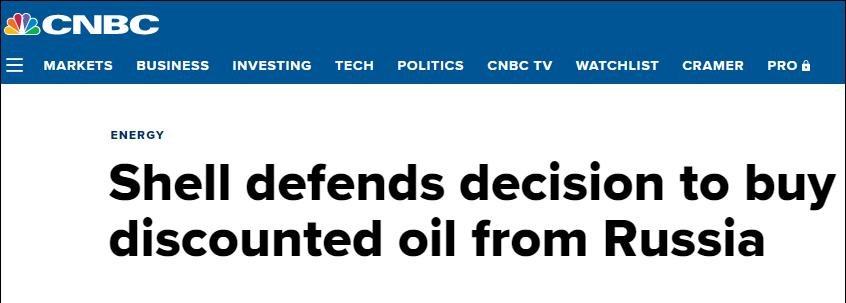The war between Russia and Ukraine continues, international energy prices are rising, and many Countries in Europe and the United States have surrounded and blocked Russia from various fields such as diplomacy, finance, art, sports, and medical care, but only energy exports are an exception.
According to the US Consumer News and Business Channel (CNBC) reported on March 6 local time, Shell, Europe's largest oil company, recently purchased a batch of Russian crude oil at a "record discounted price", which caused criticism from Western public opinion, while Shell argued that the purchase did not violate any Western sanctions against Russia.
At the same time, Bloomberg reported on March 4 that Wall Street investment institutions such as Goldman Sachs and JPMorgan Chase and Co. have recently been buying Russian corporate bonds, and Goldman Sachs has focused on buying bonds related to Russian energy and railway companies, and has begun to bid for Russian sovereign bonds. JPMorgan told clients that the company traded about $200 million in Russian and Ukrainian corporate bonds on Thursday (March 3).

Screenshot of CNBC report
On Friday (March 4), Shell reportedly bought 100,000 metric tons of Russian flagship Ural crude oil from Russian commodity trader Trafigura Group, and many companies avoided buying and caused poor russian crude oil exports due to the war between Russia and Ukraine, which was priced at $28.50 per barrel below the international benchmark Brent crude oil, the largest discount on record.
In this regard, Ukrainian Foreign Minister Kureba issued a harsh criticism on Twitter on the 5th: "I want to ask Shell a question, is it difficult that russian crude oil does not smell the bloody smell of Ukrainians?" ”
Later on the 5th, Shell said in a statement that the purchase did not violate any Western sanctions against Russia, that the company had been in intense negotiations with the government, would continue to follow their guidance on supply security issues, and was keenly aware that it had to deal with this dilemma with extreme care. "We did not take this decision lightly and we understand the strong sentiment surrounding this decision," the statement said. ”
The statement also said Shell welcomes "any direction or insight" from governments or policymakers and will continue to choose Russian crude alternatives as much as possible, but this is unlikely to happen overnight due to Russia's importance to global oil supplies.
On March 2, 2022, local time, a gas station in Los Angeles, USA, showed the price of oil. Surging imagery
On March 7, local time, Ukrainian Foreign Minister Kureba severely attacked oil companies that still have business dealings with Russia through CNBC's program. He said some big oil companies may find themselves on the wrong side of history. "The world will judge them accordingly, and history will judge them accordingly."
CNBC noted that just a few days ago, Shell announced on Feb. 28 that shell was withdrawing from a joint venture with one of Russia's largest oil companies, Gazprom, and its related entities, as a result of Russia's "senseless act of military aggression," and planned to withdraw from the Nord Stream 2 pipeline project. The Wall Street Journal revealed that as of the end of 2021, Shell has about $3 billion in non-current assets in its joint ventures in Russia.
In addition to Shell, its rival BP announced last week that it would sell its 19.75 percent stake in Rosneft, potentially costing the British oil giant $25 billion; Exxon Mobil also announced its $4 billion russian oil and gas business.
According to Bloomberg reported on March 4, as the United States and many of its allies increase sanctions against Russia and curb investor demand for Russian assets, some people on Wall Street are seizing the buying opportunities created by this.
Screenshot of Bloomberg's report
Goldman Sachs and J.P. Morgan Chase have been buying damaged Russian corporate bonds in recent days as hedge funds that specialize in cheap credit want to increase their holdings.
Bloomberg noted that finding ways to bet on "problem bonds" is standard practice on Wall Street, but that doing so after Russia launched a "special military operation" against Ukraine and was condemned by the West carries different risks. Market watchers say many of the world's countries are seeking to punish some Russian companies and drive Russia out of the global financial system, and any company that "harms the interests of these actions" could face reputational damage.
The United States and the European Union have imposed tough sanctions on Russia for "special military action" against Ukraine, but have so far taken no direct measures against Russian energy exports after oil and gas prices soared to multi-year highs.
Bloomberg argues that this highlights the dire situation facing energy buyers in Europe and the world, which need to look at how to deal with the possibility of losing one of the most important suppliers in the market. Shell's purchase of Russian crude is a "signal" that major buyers are likely to continue buying Russian energy products despite the increasingly "deadly" Russian-Ukrainian conflict.
This article is an exclusive manuscript of the Observer Network and may not be reproduced without authorization.